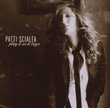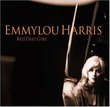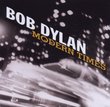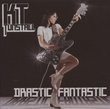| All Artists: Nikolay Andreyevich Roslavets, Marc-Andre Hamelin Title: Roslavets Piano Music / Marc-André Hamelin Members Wishing: 0 Total Copies: 0 Label: Hyperion UK Release Date: 6/10/1997 Album Type: Import Genre: Classical Styles: Forms & Genres, Sonatas, Historical Periods, Modern, 20th, & 21st Century Number of Discs: 1 SwapaCD Credits: 1 UPC: 034571169262 |
Search - Nikolay Andreyevich Roslavets, Marc-Andre Hamelin :: Roslavets Piano Music / Marc-André Hamelin
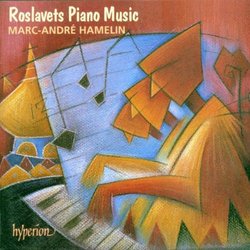 | Nikolay Andreyevich Roslavets, Marc-Andre Hamelin Roslavets Piano Music / Marc-André Hamelin Genre: Classical
|
Larger Image |
CD DetailsSimilarly Requested CDs
|
CD ReviewsRoslavets solo works Paul Geffen | 10/29/2000 (5 out of 5 stars) "The music of Nikolai Roslavets (1881 - 1944) is heavily, almost drearily, impressionistic, drawing on the worst of both Debussy and Scriabin. Roslavets developed and followed his own opaque system of tonal organization, which was never explained to or understood by anyone, including possibly the composer himself. The short pieces on this disc make extensive use of the delicate washes and sweeps of tone that Debussy exploited in his well-known works. The piano is used in a similar pointillistic way to minimize its percussive character by avoiding definite rhythms and cramming odd numbers of notes into legato lines. But Roslavets' tonal sense is nothing like Debussy's. It is alien and forbidding, a sort of suprematist abstract impressionism. Expressionist music here is built with impressionist devices. No themes are apparent here, even in the Sonatas, where some development and variations can be discerned, though I was never sure about what was being developed. The little tone poems make wonderful background music. They were not at all intrusive as long as I didn't pay attention and try to make sense of things. While at times the music shows hints of structure, it never arrives and its emotional direction and goals are generally unclear. The Sonata #1 is a very delicate thing, constructed out of fragmentary motifs and nothing like a melody. In some places it builds in intensity, to a high pitch and density, and then leaves it hanging and returns to mid-range noodling. This has echoes of Sorabji's lush chromaticism and exotica without the passion and daring of that composer. I would buy a disc of Hamelin playing Plastic Bertrand, and I found much to admire in his playing here. This music is in fact very complex, and in an unconventional notation. Hamelin finds his way through all of it, always in control, with the technical resources to span the range of moods. It's not his typical material, but challenging in its own peculiar way. This music has been disparaged as "etiolated Scriabin" and even Hamelin can only give us the pale pastels, and does not try to supply bright colors. This recording is valuable in that it gives us one more clue as to how Hamelin would sound playing Sorabji, something I would dearly love to hear. The recording is clear, if somewhat reverberant, not very different from Hyperion's other studio efforts with this pianist." A hidden revolutionary of piano music,Hamelin is superb Rachel Abbinanti (tusai1@aol.com) | Chicago | 06/30/1999 (5 out of 5 stars) "Nikolay Roslavets(1881-1944), is a forgotten master who was part of the progressive artistic community that welcomed the 1917 Revolution.It seems this generation of composers (Mosolov,Wyshnegradsky) with the darkness of what became of Russia are only now being discovered .Roslavets significant works are for the piano, for which Hamelin, an untiring instigator of the pianos neglected repertoire always performs. If you never heard Roslavets you will see how relatively homogenized and one-dimensional the music of Prokofiev and Shostakovich can be by comparison. "Three Compositions" proclaims a strong structural durability in sculpting three contrasting ideas always in a state of hightened virtuosity where the brilliance and brightness of sound, encrusted in low and high piano registers are projected.The middle piece here takes on a the structural challenge of miniature form"Agitato con passione" a mere 41 seconds. Also the "Three Etudes" are overwhelming at times bursting their classical frames it seems in ongoing ostinati-like ideas with piercing cascades of high register moments.But you always sense taut control,in that Roslavets had his own theories on atonality quite independent of The Schoenberg School. As much as you try Roslavets does not fit neatly into other creative influence,perhaps Debussy or Scriabin,but not really,Roslavets has his own voice. Again Hamelin ignites anything he plays ,reflecting gently wherever necessary,and bringing a sense of each works uniqueness. Over the course of this CD,Hamelin renders the full emotive scope of Roslavets. Even though all the works are for piano solo, you sense different creative dimensions,no repetition of creative thinking." (No title). offeck | New York, NY -- United States of America | 12/07/2000 (5 out of 5 stars) "This unjustly neglected music, a chaste mix of Scriabin, Scoenberg, Hauer, Ravel, and Busoni, but in a world of its own, rarely free of intellectual luxuriances, indulgence, or necrophiliac dalliances, and even more rarely cultivating a clarity of line, upon multiple listenings, remains undeniably powerful, fascinating, and intriguing. As usual, Hamelin makes his way with amazingly superhuman apomb through the heiroglyphic proliferation and rhythmic interplay so intricate that few pianists have the ability to decipher them let alone blend their sonorities so finely!"
|

 Track Listings (19) - Disc #1
Track Listings (19) - Disc #1